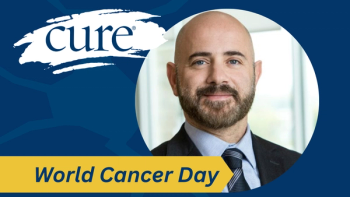
- Summer 2019
- Volume 1
- Issue 1
To Improve Quality of Life and Health Outcomes, Seek Supportive Care
When cancer centers emphasize supportive care, patients, survivors and their families benefit and health outcomes can even improve. In this issue of CURE®, we take you inside a facility dedicated to this kind of care — The Supportive Care Center at The University of Texas MD Anderson Cancer Center in Houston.
Anyone affected by cancer can tell you that care for this disease must include more than medical, surgical and radiation therapies. The side effects of cancer and its treatments can be life-changing, and it’s crucial that they be addressed.
Luckily, this kind of supportive care — which encompasses the physical, mental and emotional aspects of a patient’s health — is becoming a standard part of cancer treatment.
Bonnie Annis, a CURE® contributor, recently wrote about how painting changed her
“Creating art has helped heal my soul and heart,” Annis wrote. “The therapeutic power I feel after a few hours of creating is amazing. I have found, in my own personal life, art can heal both physical and mental pain. ... It seems, through art, I’ve regained a tiny part of what breast cancer took from me — the part of me that loved life, enjoyed beauty and always hoped.”
When cancer centers emphasize supportive care, patients, survivors and their families benefit, and health outcomes can even improve. In this issue of CURE ®, we take you inside a facility dedicated to this kind of care — The Supportive Care Center at The University of Texas MD Anderson Cancer Center in Houston. Services are provided by a multidisciplinary team of physicians, nurse practitioners/ physician assistants, counselors, psychologists, physical therapists, nutritionists, acupuncturists, massage therapists, artists and others focused on a holistic approach to cancer symptom care. We hope this article will make it clear what supportive care can and should include and what patients should request if their facilities don’t immediately offer this kind of help.
This issue also includes a feature that focuses on the side effects that can arise from gastrointestinal cancers and their treatments, describing how patients and their doctors can work to resolve them. In addition, an article about lymphedema discusses new surgeries that can, in many cases, prevent or reverse this debilitating side effect.
We hope this issue of CURE ® reinforces the importance and avail- ability of supportive care, reminding our readers to seek it out when faced with challenges that diminish their quality of life.
As always, thank you for reading.
Articles in this issue
over 6 years ago
Taking on Pancreatic Cancerover 6 years ago
Agents of Choiceover 6 years ago
Surprised by Side Effectsover 6 years ago
Our Sisters' Keepersover 6 years ago
A Look Inside a Supportive Care Clinicover 6 years ago
Reducing the Risk for Esophageal Cancerover 6 years ago
Thinking Outside the Box With Esophageal Cancer Treatmentover 6 years ago
Dream Sequenceover 6 years ago
Remaining Ever Vigilant in Cancer Screening


